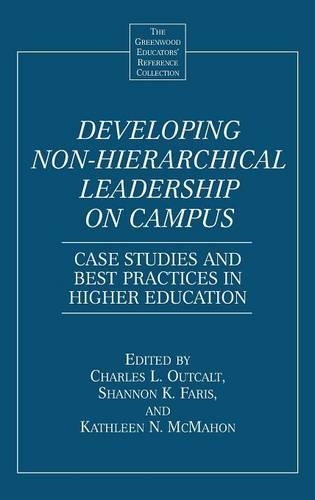
Developing Non-Hierarchical Leadership on Campus: Case Studies and Best Practices in Higher Education
(Hardback)
Publishing Details
Developing Non-Hierarchical Leadership on Campus: Case Studies and Best Practices in Higher Education
By (Author) Shannon Faris
By (author) Kathleen McMahon
By (author) Charles Outcalt
Bloomsbury Publishing PLC
Greenwood Press
30th October 2000
United States
Classifications
Tertiary Education
Non Fiction
Social and ethical issues
Social welfare, social policy and social services
378.1110973
Physical Properties
Hardback
280
Width 156mm, Height 235mm
539g
Description
Many problems that plague modern American society, including disappearance of community, decaying inner cities, racial tensions, environmental degradation, declining civic engagement, and the increasing ineffectiveness of government, to name a few, are in many respects problems of leadership. Leadership means not only what elected and appointed public officials do, but also the critically important civic work performed by those individual citizens who are actively engaged in making a positive difference in society. Clearly, one of the major problems with contemporary civic life in America is that too few of our citizens are actively engaged in efforts to effect positive social change. Educators seldom acknowledge higher education's possible contribution to these problems or the role that it might play in alleviating them. Colleges and universities provide rich opportunities for developing leaders through the curriculum and co-curriculum. Co-curricular experiences not only support and augment the students' formal classroom and curricular experience, but can also create powerful learning opportunities for leadership development through collaborative group projects that serve the institution or the community. These projects can be implemented through service learning, residential living, community work, and student organizations. In the first section, Alexander W. Astin and Helen S. Astin, two of the most influential authors in education and co-principal investigators for the research team that devised Social Change Model of Leadership Development, share their insights on the model they helped create. Also in this section, other leading theoreticians offer provocative and challenging insights into non-hierarchical leadership. The second section features case studies and other examples from the practical realm. Contributions come from a wide array of programs and institutions, from community colleges to Ivy League institutions to urban public universities. Because campuses are increasingly diverse, leadership programs must not only acknowledge but embrace the multiplicity of identities personified in their students. Accordingly, the next section offers essays and case studies on complex issues of intersection of leadership and identity. The book concludes with two chapters essential for those seeking to access leadership development: one focusing on the need for assessment, the other containing an account of the first-ever instrument designed specifically to access non-hierarchical leadership, written by the creator of this instrument.
Reviews
This is an excellent book. I recommend it highly to leadership practictioners, faculty, students, and any person who shares an interest in non-hierarchical leadership. It is a volume you will revisit time and again whether you are wrestling with a new concept, preparing a presentation, planning a change process. I guarantee that within short order our edition . . . will bear the scars of ample use. That can only mean good things for the future of non-hierarchical leadership development. * Concepts & Connections: Teaching Leadership *
One of the key strengths of this book is the inclusion of student voices. Each of the four sections opens with a quote or reflection from one or more students and the inclusion of student voices in many of the chapters adds much to the presentation of the material. . . . [P]racticing student affairs professionals developing the next generation of student leaders may find this to be a useful resource. * Journal of College Student Development *
Author Bio
Charles L. Outcalt is a PhD candidate and former assistant dean of Students at UCLA. Shannon K. Faris is a project manager at Public Works, Inc. Kathleen N. McMahon is assistant dean of Students at UCLA.
